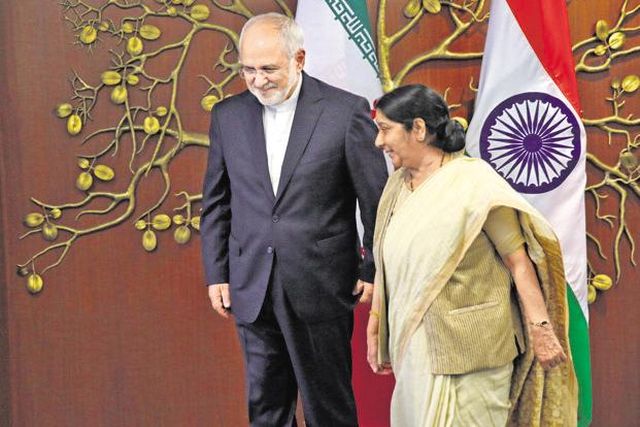
by Editor | May 25, 2021 | Corporate, Corporate Governance, News, Politics
 By Arul Louis,
By Arul Louis,
United Nations : External Affairs Minister Sushma Swaraj and Iranian Foreign Minister Mohammad Javad Zarif discussed US sanctions against Tehran amidst American President Donald Trump issuing dire warnings at the Security Council against violating the embargo.
India and Iran “shared each others’ position about where we stand at this point of time” on the sanctions, External Affairs Ministry spokesman Raveesh Kumar told reporters after the Ministers’ meeting on the sidelines of the UN General Assembly session here on Wednesday.
At the Security Counci, Trump said that the sanctions against Iran will come into full force in November and warned “any individual who fail to comply with these sanctions will face full consequences”.
Kumar said that India was engaged with all the stakeholders dealing with the sanctions and, therefore, it discussed it with Iran also.
Zarif told Sushma Swaraj about Iran’s interaction with the European Union (EU) and other countries over the sanctions, according to Kumar.
The spokesman said that Iran and India had “civilisational ties” going back in time and the discussions went beyond the sanctions issue.
Trump pulled Washington out of the nuclear deal known as the Joint Comprehensive Plan of Action (JCPOA) that Iran signed with the five permanent members of the UN Security Council, Germany and the EU, to end sanctions in return for Teheran stopping nuclear weapons development.
The EU and most countries back the nuclear deal and oppose US sanctions and Trump found himself isolated at the Security Council.
Washington’s allies, British Prime Minister Theresa May and French President Emmanuel Macron, openly opposed Trump at the Security Council meeting and expressed their support for the agreement with Iran.
Kumar declined to comment on foreign media reports that India was going to stop importing Iranian oil.
(Arul Louis can be reached at arul.l@ians.in and followed on Twitter at @arulouis)
—IANS
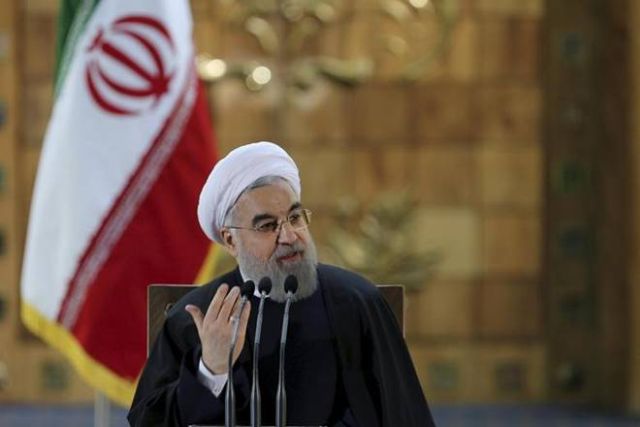
by Editor | May 25, 2021 | Muslim World

Hassan Rouhani
United Nations : Iranian President Hassan Rouhani on Tuesday blasted the US-led sanctions against his country as “economic terrorism”.
“World security is under threat by some states’ recklessness and disregard of international values and institutions,” Rouhani made the remarks at the ongoing General Debate of the 73rd UN General Assembly, Xinhua reported.
“Confronting multilateralism is not a sign of strength. Rather, it is a symptom of the weakness of the intellect. It betrays an inability in understanding a complex and interconnected world,” he said.
Rouhani lashed out at US President Donald Trump in his speech, saying he is seeking an “overthrow” of the Iranian leadership.
Speaking of the Joint Comprehensive Plan of Action (JCPOA), known commonly as the Iran nuclear deal or Iran deal, Rouhani said that “we are pleased that the international community did not acquiesce to the US illegal and unilateral withdrawal from that agreement.”
President Trump called on the rest of the world to isolate Iran and said a US campaign of “economic pressure” would turn back “Iran’s aggression,” in his second address to the UN General Assembly.
At last year’s General Debate, Trump criticized the 2015 nuclear deal with Iran, calling it “one of the worst and most one-sided transactions the United States has ever entered into.”
Iran deal is an agreement on the nuclear programme of Iran reached in Vienna on July 14, 2015 between Iran, the P5+1 (the five permanent members of the United Nations Security Council – China, France, Russia, United Kingdom, United States – plus Germany).
In May, US President Trump announced Washington’s withdrawal from the landmark Iranian nuclear deal. Since then, the Trump administration has slapped a number of sanctions on Iran while vowing to apply more.
—IANS
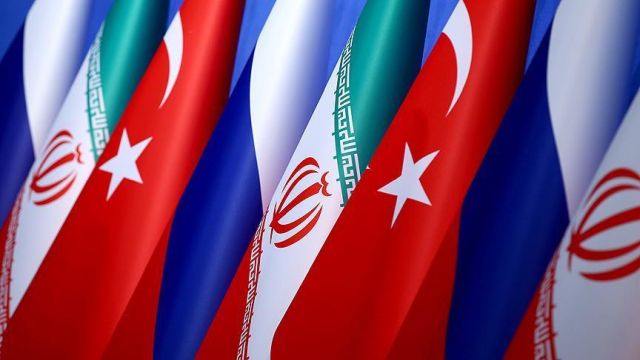
by Editor | May 25, 2021 | Business, Emerging Businesses, SMEs, World
 Tehran : Turkey, Russia, and Iran have agreed to use their local currencies for trade between the three countries, according to Central Bank of Iran Governor Abdolnaser Hemati on Saturday.
Tehran : Turkey, Russia, and Iran have agreed to use their local currencies for trade between the three countries, according to Central Bank of Iran Governor Abdolnaser Hemati on Saturday.
Hemati told the media a meeting with the administrators of Turkish and Russian Central Banks is expected in the near future and he hopes the agreed topics would rapidly come into effect.
The governor termed the meetings in Tehran that saw the participation of Russian President Vladimir Putin and Turkish President Recep Tayyip Erdogan during the trilateral summit on Syria as fruitful.
He said they had agreed on the trade of petroleum, gas, and fundamental products, and also agreed on some banking issues.
The three countries agreed the US dollar should not be used for trade, Hemati said. He added that transactions will be made over designated currency exchange rates.
A trilateral summit on Syria was held in Tehran on Friday by Turkish, Russian and Iranian leaders.
—AG/UNA-OIC
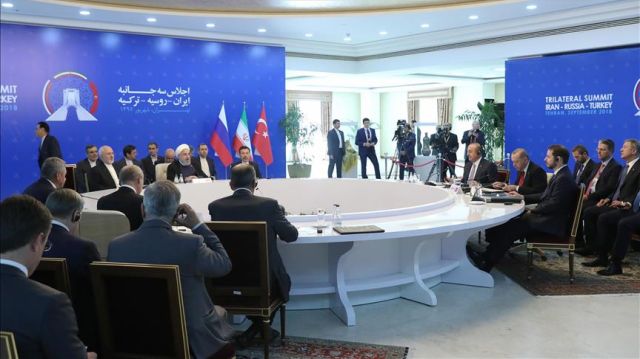
by Editor | May 25, 2021 | Business Summit, Events, Muslim World, Social Round-up

President of Turkey Erdogan, President of Iran Rouhani and President of Russia Putin attend trilateral summit on September 7, 2018 in Tehran, Iran.
By Satuk Bugra Kutlugun,
Ankara: Turkey, Iran, and Russia on Friday called for a political solution to the crisis in Syria in a joint statement issued at the end of a trilateral summit in the Iranian capital Tehran.
“There could be no military solution to the Syrian conflict and it can only end through a negotiated political process.
“[They] reaffirmed their determination to continue active cooperation with a view to advancing the political process in consistence with the decisions of the Syrian National Dialogue Congress in Sochi and the UN Security Council Resolution 2254,” the statement said.
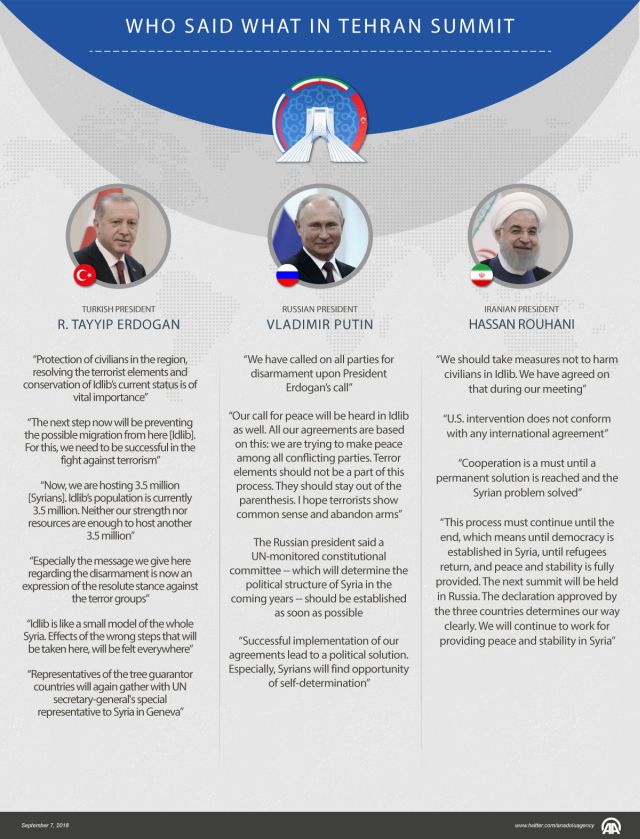
The leaders expressed their “satisfaction with the achievements” of the Astana format since January 2017, in particular, the progress made in “reducing violence across the Syrian Arab Republic and contributing to peace, security, and stability in the country.”
Iran, Turkey and Russia “emphasized strong and continued the commitment to the sovereignty, independence, unity and territorial integrity of Syria, as well as to the purposes and principles of the UN Charter and highlighted that they should be respected by all.”
The leaders “rejected all attempts to create new realities on the ground under the pretext of combating terrorism,” while expressing determination to stand against separatist agendas aimed at undermining the sovereignty and territorial integrity of Syria and national security of neighboring countries.”
The joint statement said the leaders highlighted the “need to create conditions for the safe and voluntary return of refugees and internally displaced persons (IDPs) to their original places of residence in Syria.”
Russia, Iran, and Turkey also called for the United Nations and its humanitarian agencies to help Syria by providing additional humanitarian aid.
The joint statement also welcomed the progress in the work of the Working Group on the release of detainees and abductees, and handover of the bodies as well as the identification of the missing persons, as undertaken with the participation of the UN and ICRC experts.
The next tripartite meeting will be held in Russia, upon the invitation of President Putin.
—AA

by Editor | May 25, 2021 | Corporate, Corporate Governance, News, Politics
 By Arul Louis,
By Arul Louis,
New York : US Secretary of State Mike Pompeo has said that India’s planned purchase of a Russian missile system or its relations with Iran will not be “the primary focus” of the “incredibly important” 2+2 Strategic Dialogue meeting he and Defence Secretary Jim Mattis will be having with External Affairs Minister Sushma Swaraj and Defence Minister Nirmala Seetharaman this week.
Calling India a “true strategic partner,” he said on Tuesday the meeting in New Delhi is “really about things that are big and strategic and will go on for 20, 40, 50 years” and “those are the kinds of topics that Secretary Mattis and I are hoping to address”.
“We have a true strategic partner who, frankly, is our only major defence partner… with whom we have a great relationship and who is very important to our success in our Indo-Pacific strategy — enormous country with incredibly opportunity and capacity for wealth creation,” he told reporters travelling with him to India according to a transcript provided by the State Department.
“We hope we can find opportunities to continue to expand the relationship not only diplomatic and military-to-military but a good set of business relationships as well,” he added.
“There’s half a dozen things on the agenda that we’re really intent on making progress on,” he said.
The 2+2 Strategic Dialogue was postponed twice at the request of the US — first in April when the leadership of the State Department was transitioning from Rex Tillerson to Pompeo.
“I regret it was my fault the second time” in July, he said. “I had to travel to Pyongyang.” Trump had suddenly set up a summit with North Korean leader Kim Jong-un.
Prime Minister Narendra Modi and Trump had decided on the Strategic Dialogue when they met in Washington in 2017.
Trump administration’s strategic vision embodies India and the US as “the two bookends of stability” in the Asia Pacific region — and a counterbalance to China’s rising power.
Symbolically, the US now calls the region Indo-Pacific and even renamed its Pacific military command.
At this week’s meeting, Iran and the Russian missile defence system purchase “will certainly come up, but I don’t think they will be the primary focus of what it is we are trying to accomplish here,” Pompeo said.
“Those decisions are important to the relationship for sure, but I don’t see us resolving those during this set of meetings of the Strategic Dialogue,” he added.
India is planning to buy five advanced S-400 Triumf air defence missile systems from Russia in a deal estimated to cost about Rs 40,000 crore.
India reportedly also plans to continue buying oil from Iran despite threat of sanctions by Trump, who reneged on the agreement between Iran and the five permanent members of the UN Security Council and Germany to stop Tehran’s nuclear programme.
(Arul Louis can be reached at arul.l@ians.in and can be followed on Twitter at @arulouis)
—IANS






